| Having trouble viewing this email? Click here . |
|
|
Auckland’s recovery – community update
|
|
Categorisation progress updateWe now have around 2600 properties in our categorisation programme, after receiving almost 500 new sign-ups since the start of the year. The programme is about understanding the risk to life from future weather events, so we are still encouraging at-risk homeowners to opt-in to this limited scheme.
Over 2300 desktop and 1500 on-site assessments have been completed, providing a good foundation for our risk assessments.
So far, the number of properties within each category is in line with what we expected, including the majority of homes being Category 1 – with no intolerable risk to life. With the buyout process in full swing, we are looking to start deconstruction on the first handful of homes at the end of the month.
Categorisations finalised across Auckland (as at 9 March)
| Category |
Number of properties |
Estimated total |
| 1 |
494 |
~1670 |
| 2A |
4 |
n/a |
| 2C |
0 |
~120 |
| 2P |
17 |
~110 |
| 3 |
214 |
~600 |
| Total |
729 |
~2500 |
Read the full story on OurAuckland, including a breakdown of categorisations per suburb.
|
|
|
|
|
Webinar: How we measure risk and decide property categoriesYesterday over 400 people tuned into the Tāmaki Makaurau Recovery Office webinar on how we measure risk and decide property categories. This is a more in-depth look at how our technical specialists assess and measure the ‘intolerable risk to life’ threshold.
If you missed the webinar, you can watch the recording and download the presentation from Wednesday 20 March, on the Auckland Council website Storm-related community engagement page.
This webinar is the second in a series. We will shortly advertise webinars on:
- Insurance related issues (Q&A with industry experts)
- Information for Category 1 property owners
- Property deconstruction and future land use.
Dates and times are yet to be confirmed, but we will keep you posted. If you’d like to catch up on our webinars, you can find them all on the Auckland Council website.
|
|
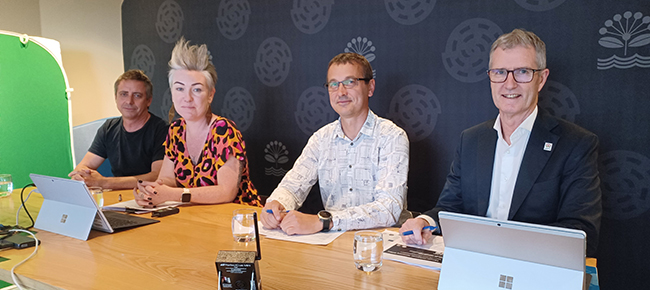
|
|
Group Recovery Manager role extended and transition plan signalledTāmaki Makaurau Recovery Office (TMRO) Group Recovery Manager Mat Tucker (pictured right) will continue in the role until the end of this financial year, extending his initial contract by two months and signalling the very early stages of Auckland’s transition out of recovery from the 2023 severe weather events.
On 1 July, Deputy Group Recovery Manager Mace Ward will step in to complete transition and ongoing implementation of the recovery plan to December 2024.
Auckland Council Chief Executive Phil Wilson, said: “Our region’s recovery journey is by no means over, and the TMRO will remain in place until the end of 2024, but we’re now in a position to plan for a natural transition from a dedicated office, to recovery being managed within the council’s existing operational structure.”
|
|
|
|
|
Question of the weekI’ve had an email from my insurance company stating that if I don’t cash settle my claim urgently the council will not give me a category and I will be overlooked until I settle the claim for my house repairs. Is this correct?
No, it is not. We will continue to progress your property through the assessment and categorisation process regardless of whether you are insured or have settled your insurance claim.
Your insurance status only becomes relevant to council if you are found to be Category 3 or Category 2P and you wish to participate in one of the financial support schemes.
If you would like free, independent advice about your insurance claim, you can contact the NZ Claims Resolution Service.
Please see our ‘Guide to progressing work on your home’ (including repairs through insurance) and ‘Guide to how we make category decisions’ in our storm recovery documents library. You can also find our Category 2P and Category 3 homeowner handbooks and other useful resources on this page.
|
|
|
|
|
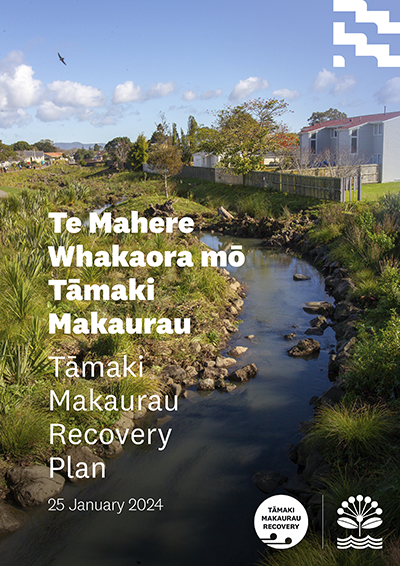
How does the Tāmaki Makaurau Recovery Plan work?Recovery from a natural disaster can be a long and complex process. The recovery plan helps us to focus on recovery activities, invest in areas that need support, and prioritise the right activities at each recovery phase.
This starts with supporting affected individuals, whānau, communities and businesses with their essential needs. From there, we can move to becoming more resilient to future events. This includes:
- removing people from situations that put their lives at risk
- reducing and mitigating hazards
- repairing and improving infrastructure, and
- planning for the future.
Taking direction from this roadmap, we are implementing the recovery plan through four whenu (strands):
- Community and Social Recovery
- Māori Partnership and Participation
- Natural and Built Environment
- Economic Recovery.
Projects and initiatives under these whenu (pictured below) work together to drive our recovery.
To learn more about the recovery whenu, view or download the Tāmaki Makaurau Recovery Plan online.
|
|
|
|
|
Reminder: Have your say on Auckland’s Long-term PlanAucklanders have until 28 March to have their say on the council’s Long-term Plan (LTP) 2024-2034.
Among the topics council wants your feedback on is strengthening Auckland’s resilience to flooding with the new Making Space for Water Programme, which has three options available:
- Central proposal: $1 billion of investment (including government co-funding) delivered within 10 years
- Pay more, get more: Making Space for Water programme is accelerated and delivered within six years (where possible)
- Pay less, get less: Focus on maintenance works only, providing less resilience against flooding and not taking full advantage of the government’s $380 million co-funding.
|
|
|
|
|
Piha and Karekare geotechnical updateAuckland Council has now confirmed property categories for 88 out of 119 properties in Piha and Karekare. The remaining 31 properties in the GHD study areas will receive their categories over the next couple of weeks and we have communicated this to these property owners directly.
If you, or your whānau need help, we have navigators available to support you. Please email your navigator directly or contact navigators@aucklandcouncil.govt.nz.
If you have any questions about your property’s risk assessment, please email propertycategory@aucklandcouncil.govt.nz. We also have lots of information on OurAuckland, including FAQs, that you may find helpful.
|
|
|
New Storm Recovery Liaison for Piha and KarekareNext week Faith Hyland will be taking over from Samantha Peters as the Storm Recovery Liaison for Piha and Karekare.
Like Navigators, Storm Recovery Liaisons are based in the Community and Social Recovery team in the Tāmaki Makaurau Recovery Office.
While Navigators support individuals and whānau, Storm Recovery Liaisons work alongside groups and organisations to ensure communities have the information they need about recovery and that they can influence the decisions that affect them.
Samantha is off on maternity leave, and we wish her all the best!
Reminder: Contacts for the Recovery Office
General email: recoveryoffice@aucklandcouncil.govt.nz
Property categorisation queries: propertycategory@aucklandcouncil.govt.nz
Support for mental health, finance, insurance or accommodation: Contact your Navigator directly, or email navigators@aucklandcouncil.govt.nz.
|
|
|
Cordon removal: Marine Parade South, PihaThe final remaining cordon at Marine Parade South, Piha will be removed on Monday 18 March at 6am.
With more than a year passing since the devastating storms, the safety risk along the road has reduced.
The seven properties behind the cordon have been communicated with directly and those properties are in the final stages of getting their property category.
Ad hoc security patrols will commence to deter burglary and/or vandalism of property, as well as monitoring the condition of the Category 3 houses.
|
|
|
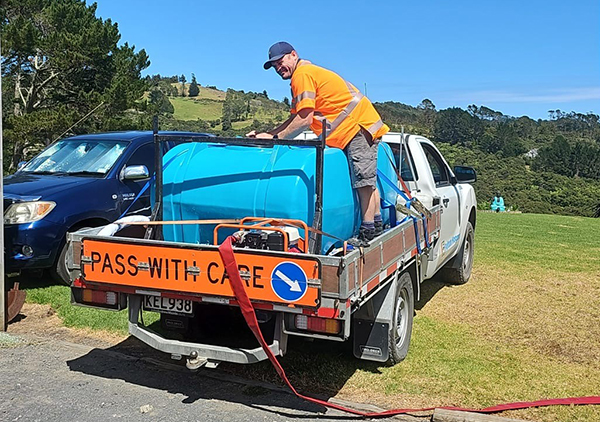
|
AT update
Caton Road water rescue
Caton Road residents in Waitākere had their ‘water woes’ solved by Auckland Transport (AT) and Fulton Hogan recently.
Caton Road was so badly damaged in the 9 May storm last year that AT had to apply a 3.5 tonne weight restriction. This was a problem for residents who rely on tank water, because water trucks weigh about 20 tonnes. When summer turned out to be a dry one, some residents reached crisis point.
Read the full story on OurAuckland.
North Urban Newsletter
Read AT’s March update for the latest information on north urban flood recovery repairs, including Ridge Road, Paremoremo Road and Dairy Flat Highway.
|
|
|
AT update for Piha and KarekareScenic Drive, Waiatarua
Scene Drive, Waiatarua (elevation site) has now reopened to two lanes, after work was completed by AT contractor, Fulton Hogan on Monday 11 March.
Glenesk Road
Work is expected to begin on Glenesk Road in late March and will take about three months.
Downer will repair the slip outside 7-19 Glenesk Road to stabilise the area and prevent further slips and damage.
The current road closure with resident-only access will remain, to enable our team to do the work safely. There will also be parking restrictions.
Rayner Road
Work is ongoing between 47 and 49 Rayner Road. The road will be sectioned off to enable vehicles to use the side of the road that is not over the slip.
AT will monitor this site for geotechnical risk over the long term – the end date will depend on the monitoring results. This is separate from the geotechnical risk assessments required for the council’s property categorisation process.
|
|
|
|
|
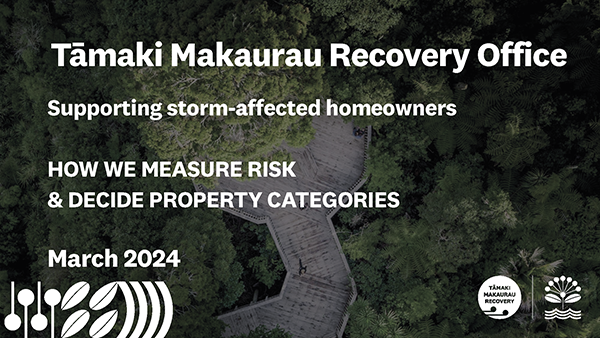
|
New to this newsletter?If you’re new to this newsletter, there’s a few things you can do to get up to speed on property categorisations, buy-outs, placards and more.
|
|
|
|
|
Know someone with English as a second language?In an effort to connect with more storm-affected Aucklanders, the Tāmaki Makaurau Recovery Office has some content in our region’s most spoken languages – Simplified Chinese, Hindi, Samoan, Tongan, Korean and Māori.
If you know someone who has English as a second language, please show them our multi-language brochure ‘Have you been affected by extreme weather events?’, which can be found in the storm recovery documents library on the council website.
To speak to someone in your preferred language, contact our call centre on
09 884 2070 and you will be connected with a translator during the call.
|
|
|
|
|
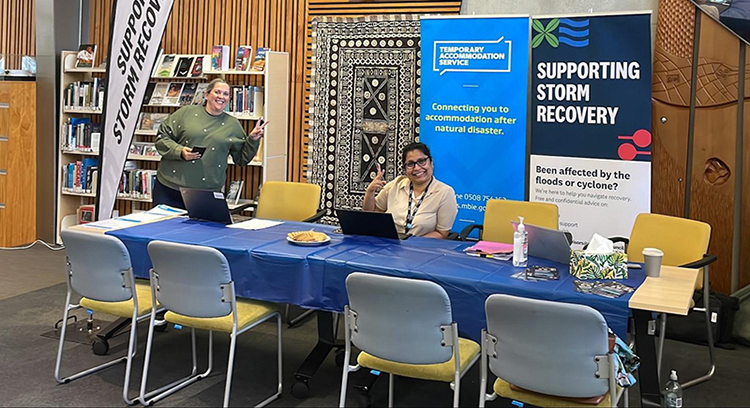
|
Need support?Various social and wellbeing support is available to people affected by the 2023 severe weather events. This includes free help with processing home insurance claims, rates relief, and identifying other services you may be eligible for, such as temporary accommodation assistance, and other financial and mental health support.
Find out what support is available on OurAuckland.
Navigator drop-ins
We have upcoming navigator drop-in events in Epsom, Māngere, Mt Roskill, Northcote and Browns Bay where you can speak face-to-face with our navigators.
|
|
|
Tools for managing anxiety: free online seriesDo you want to gain skills for managing your anxiety?
Mental Health Education & Resource Centre (MHERC) is hosting a free five-part online series that will provide ideas and strategies for coping with anxiety.
With a range of topics, you can attend all five sessions or just the ones that interest you. Sessions are every Monday 6pm-7.30pm starting 18 March (except for Easter Monday 1 April), with the last session on 22 April.
|
|
|
|
|
Reminder: Weathering the Storm workshops
- 11 April, Māngere, Auckland
- 20 May, Mt Roskill, Auckland
- 28 and 29 May, online
- 24 June, Henderson, Auckland
Weathering the Storm is a free workshop aimed at helping you to manage stress and heightened emotions associated with extreme weather events.
Funded by Te Whatu Ora and brought to you by Blueprint, you’ll get practical advice on how to support others, tips for reducing weather-related anxiety, and tools to help build resilience for the future.
|
|
|
|
|
Climate action grant available for community groupsA climate action grant is now open to support communities to adjust to a changing climate and the natural hazards that it could bring.
Auckland Council’s Auckland Climate Grant is available for projects or activities that grow Aucklander’s participation in local climate action or build community resilience to climate impacts.
Community groups and iwi can apply for the grants, which can range between $1000 and $15,000, and is open until 28 March 2024.
To find out more, including help in applying for a grant, visit Auckland Council’s Live Lightly website.
|
|
|

|
|
Know someone who might need this newsletter? Forward this email to them and get them to sign up.
|
|

